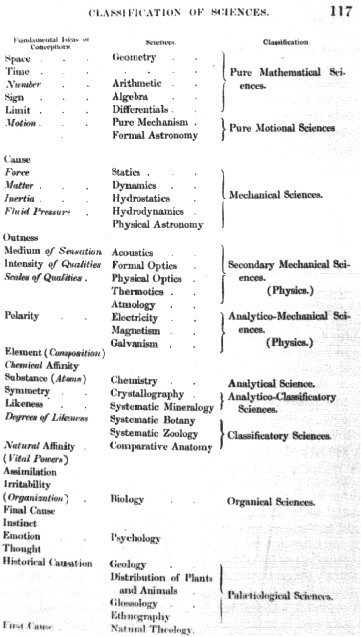 William Whewell
(1794-1866)
was one of the leading figures of nineteenth-century science. Whewell's wide
range of activities and expertise make him particularly difficult to label.
He wrote authoritatively on architecture, mechanics, mineralogy, moral philosophy,
astronomy, political economy, and the philosophy of science. He he very often
called a polymath. One of his contemporiaries poked fun at Whewell, remarking:
"Science is his forte, omniscience is his foible."
William Whewell
(1794-1866)
was one of the leading figures of nineteenth-century science. Whewell's wide
range of activities and expertise make him particularly difficult to label.
He wrote authoritatively on architecture, mechanics, mineralogy, moral philosophy,
astronomy, political economy, and the philosophy of science. He he very often
called a polymath. One of his contemporiaries poked fun at Whewell, remarking:
"Science is his forte, omniscience is his foible."
Whewell was a co-founder and president of the British Association for the Advancement of Science, a fellow of the Royal Society, president of the Geological Society, and for many years Master of Trinity College, Cambridge. Whewell had a particular skill for devising new terms. He coined the words "anode," "cathode," and "ion" for Faraday and the word "scientist" in 1833 (the term, however, did not come into general use until the very end of the century). Whewell is perhaps most remembered today for his Philosophy of the Inductive Sciences (1840). In addition to his influential pronouncements on the proper way to do science, Whewell also attempted to classify the sciences (see figure). Whewell wrote that the essence of induction was "the colligation of facts by means of a concept". In other words a wide range of facts should be brought together to support a conclusion. A theory could be considered confirmed if many independent inductions from experience are unified and fit together within the theory. Whewell was a Kantian rather than an empiricist like Herschel or J.S. Mill. Whewell and Mill carried on a lively debate on these matters.

Whewell's classification of the sciences from Philosophy of the Inductive Sciences, 2nd 3dn. vol.2, 1847, p. 117.
Whewell's position as one of the elites of Victorian science can be inferred, apart from everything else, from his authorship of one of the famous Bridgewater Treatises: On Astronomy and General Physics.
Whewell also famously opposed the idea of evolution. First he published a
new book, Indications of the Creator, 1845, composed of extracts from
his earlier works to counteract the popular anonymous evolutionary work, Vestiges
of the Natural History of Creation. Later Whewell
opposed Darwin's theories of evolution.
Further reading
Brooke, J. H. "Natural Theology and the Plurality of Worlds: Observations on the Brewster-Whewell Debate." Ann. Sci 34 (1977): 221-86.
Brooke, J. H. "Richard Owen, William Whewell, and the Vestiges." British Journal for the History of Science 10 (1977): 132-45.
Cannon, W F. "The Whewell-Darwin Controversy." Journal of the Geological Society, 132 (1976): 377-84.
Fisch, Menachem and Simon Schaffer, eds. William Whewell: A Composite Portrait. Oxford, 1991.
Forster, Malcolm. R. and Ann Wolfe. "The Whewell-Mill Debate in a Nutshell."
Todhunter, I. William Whewell, D.D., Master of Trinity College, Cambridge. An Account of His Writings with Selections from His Literary and Scientific Correspondence. 2 vols. London: 1876.
Whewell, William. The Elements of Morality, including Polity. 2 vols., 1845.
--. History of the Inductive Sciences, from the earliest to the present time. 2 vols., 1847.
--.The Plurality of Worlds, 1858.
--. Six Lectures Delivered on Political Economy, 1862.
Yeo, R. Defining Science: William Whewell, Natural Knowledge, and Public Debate in Early Victorian Britain. Cambridge, 1993.
Online resources
"William Whewell" in the Stanford Encyclopedia of Philosophy
"Natural Theology, Victorian Periodicals and the Fragmentation of a Common Context," by Robert M. Young.
William Whewell's archives (held at various places in the UK)
"Architecture and Induction: Whewell and Ruskin on Gothic," by Jonathan Smith.
Last modified 30 July 2023